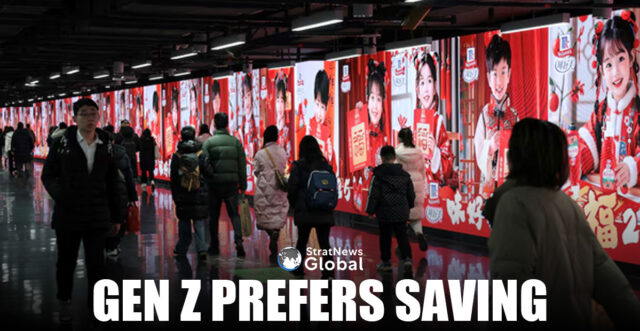The frugal trend that emerged in China during the pandemic’s economic disruptions has strengthened amid the ongoing property market crisis.
Gen Z is increasingly resisting government appeals to boost spending and prioritising saving instead.
On China’s Instagram-like Xiaohongshu, or RedNote as it is known in the West, many under-30s are swapping notes on how to spend less on office lunches and shop on the cheap.
Financial Discipline
Influencers are also sharing tips on turning financial discipline into a lifestyle.
Posts on how to save money total more than 1.5 million with more than 130 million views.
“I feel that the economy is quite bad, and it seems like it’s hard for everyone to make money, so I think it’s important to protect my own wallet,” said Ava Su, who joined Alibaba after graduating just over six months ago and earns a relatively comfortable salary.
Su, 26, who sees the internet industry as “unstable”, said she had cut back on impulse spending and had a long-term plan to save up two million yuan ($273,512) – 100 times her monthly salary.
Gen Z Doubles Deposits
According to data from Yu’e Bao, a popular online money market fund on the Alipay payment app, users born after 2000 each made an average of 20 deposits a month as of the end of 2024, double the number of May.
The May figure was itself 10 percent higher than the previous year.
Yu’e Bao also said the funds each person had in their account that month was nearly 3,000 yuan, fifty per cent more than the same month the previous year.
Some economists warn that entrenched saving could hollow out demand just as policymakers are counting on domestic consumption to bolster China’s gross domestic product.
Sustained pessimism, which has already led to falling consumer prices from cars to bubble milk tea, will also dent the longer-term potential of the world’s second-biggest economy.
The situation is a stark contrast to the free-spending attitudes of the so-called “moonlight” generation, a term used to describe those born in the 1980s and 1990s.
They saw only expanding job opportunities, rising incomes, and a quality of life that kept on improving, said Ho-fung Hung, professor in political economy at Johns Hopkins University, and were known for spending their entire salary by the end of every month.
But COVID-19, the economic slowdown and the government’s crackdown on tech companies and other parts of the private sector made today’s young people feel they needed to prepare for the worst, he added.
“This loss of optimism is a first since the beginning of (China’s) market reform in 1978,” Hung said.
Job Insecurity
The pessimism means many young people are seeking “iron rice bowl” jobs at government departments or state-owned enterprises that they believe offer more job security.
Unemployment among the roughly 100 million Chinese aged 16-24 has remained elevated in the last two years.
The youth unemploiyment rate hit an all-time high of 21.3% in June 2023, prompting officials to halt the release of the data series and “reassess” how numbers were compiled.
The recalibrated youth jobless rate stood at 15.7% in December last year.
Unlike the millennial philosophy of enjoying life to the fullest, the existential angst of China’s Gen Z has only deepened alongside the country’s economic malaise, and they have doubled down on saving.
‘Involution’ Deepens Economic Strain
In the recent past, they spoke in Chinese of “tang ping”, or “lying flat”, and lamented a society beset by “involution”, which refers to the state of being trapped in a meaningless rat race.
Those buzzwords followed the rise of “sang” culture, which celebrated defeatism, and “Buddhist youth”, referring to young people’s indifferent attitude to life.
“The ‘involution’ trend may intensify price competition and fuel disinflation as firms fight for weaker demand,” said Gary Ng, senior economist at Natixis in Hong Kong.
“Such a consumption downgrade may hollow mid-price range products and services. China’s long-term potential growth will decelerate.”
China’s 2024 gross domestic product grew 5.0%, data on Friday showed, but GDP growth is expected to ease over the next two years.
(With inputs from Reuters)





